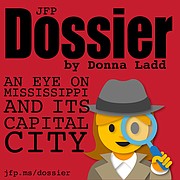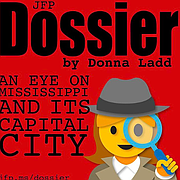NBC News Political Director Chuck Todd stepped in it for his brand of horse-race reporting, excusing himself as “naive.” Mississippi has a similar problem, and only good journalism leadership can fix it. Photo by Jeff Griffith on Unsplash.
If you were caught up in the spirit of the holiday, as I was on Christmas Eve, you might have missed one of the more disturbing interviews ever with a national journalist, and that's not hyperbole. Close to midnight, Rolling Stone posted an interview with NBC News Political Director Chuck Todd, also the host of "Meet the Press." In it, the beleaguered and supposedly expert journalist revealed that he has just recently figured out that Donald Trump and his supporters are intentionally using his program to spread disinformation (which he inaccurately called "misinformation," but we'll come back to that.)
As New York University journalism professor Jay Rosen details in his column following the Rolling Stone interview, it was on Todd's show back in 2017 that Trump adviser Kellyanne Conway first dropped the soon-viral "alternative facts" firebomb to excuse obvious lies her boss was telling about inauguration crowds. But as Rosen explains, Todd acts as if his being a supposed political expert on one of the nation's most prominent broadcast platforms did not give him the responsibility to immediately recognize, and question and push back on, such obvious uses of propaganda to deceive the public. He was "naive," Todd says repeatedly in the interview, as if somehow all of us who weren't naive and not paid nearly as much as Todd with such a prominent platform should give him a pass for being woefully under-qualified for his position.
Giving obvious liars and obfuscators "equal" time is an illness in too much journalism, and it forms the basis of the very poisonous "horse race" reporting that pretends that two competing opinions, true or not, form the basis of good, "neutral," "nonpartisan" journalism. Very rudimentary logic skills show that doing that, in fact, gives the liar (or racist, or misogynist, or shyster, or grifter) the advantage of being treated equally to someone who, well, isn't those things as basic fact-checking can show.
Our job is reporting the truth, not just two opinions.
'Other Side' Reporting Leaves Little Room for Thought, Agreement
Think about it this way: If all you're doing is running to destroy rather than build and help—or to block bridge repair or work to keep rural hospitals open—you're not going to talk about that in interviews or at debates. You're going to slam "the other side" (a horrifically divisive, misleading, binary phrase journalists should avoid) for being "too liberal," "socialist" or whatever, even if they're actually not.
In Mississippi, you're going to obfuscate and finagle debates into who is "more conservative," as if that label applies the same to everyone who claims it. That's as silly as thinking there are always or only two "sides" to every question or issue. I learned at Mississippi State University pursuing my political-science degree decades ago that people and politics are far more complicated than such simplistic two-headed assumptions. Surely, that information is also available to network political directors far from Starkville, Miss.
Recall Tate Reeves pulling this string in the gubernatorial election this year against both Republican Bill Waller and Democrat Jim Hood. In this case, a man avoiding issues and hurling insults and even false allegations was on one "side," and both a Republican and a Democrat were on the other "side," discussing real issues like health care and education. One Mississippi outlet framed a whole Republican debate story around who was "more conservative," even as Ashton Pittman chose to focus on specifics of candidates' positions on vital issues like Medicaid reform and education. The difference in journalistic approach couldn't be more stark. One is designed for partisan drama, clicks and TV ratings; the other is focused on solutions and progress regardless of party.
Rosen's column calling out Chuck Todd's "naive" excuse-making is superb, and you should read it while thinking about how political coverage is done in Mississippi. (In fact, there is one political reporter in Mississippi who is a Chuck Todd clone when it comes to "naive" political coverage, but it's only the third day of Christmas, so I won't call him out by name, but it's obvious if you pay attention.)
Media: Horse-Race Election Reporting Signifies Nothing
With horse-race reporting, Mississippi media buries candidates who want to focus on real issues.
But what Rosen didn't get into much in this column is that the buck doesn't ultimately stop with Chuck Todd. It is not entirely the fault of reporters, TV hosts or middle-management directors twisting horse-race reporting and other-siding election coverage into a partisan boxing match that tells readers and listeners very little they need to know to make good decisions and counter disinformation campaigns.
It's about the messaging from above and what leadership allows and demands.
Political Coverage Too Often a Business Decision
How an outlet covers politics is always about its leadership, whether newsroom leaders or the money-folks, boards or executives pulling the purse strings. Horse-race coverage, which simply obscures issues that wouldn't divide people as dramatically if not presented as an "oh, yeah?" shouting match, is pretty much always a business decision.
That is true for traditional journalism powerbrokers, who do not want to anger the powerful and lose their advertising or not get invited to the hoity-toidy Christmas parties in Eastover here or Southhampton up there or out in Aspen. Sadly, it can also be true in nonprofit media, especially if big backers have business interests they believe the coverage of the publications they back may harm. Put simply, today's journalism is still just as much at risk of self-censorship from the top as traditional journalism ever was. I heard a story recently about a successful nonprofit media outlet in another state with massive oil interests that does very little journalism about that industry, for instance. It's not hard to guess why that's true.
In NBC News' case, it's no secret by now—thanks largely to Ronan Farrow's journalism—that executives work to appease the powerful, including on the radical-right (but farther left, too). That has meant, to name just two at NBC News, hiring climate-change deniers as talk-show hosts to "balance" the "liberal" hosts who actually know the science on climate change is real, and a disastrous flirtation with former FOX News talker Megyn Kelly that cost the network many millions after it finally let her go.
In fact, Chuck Todd calling himself "naive" for not spotting the disinformation efforts by many of his guests years ago is right in line with the shock and dismay his boss, NBC News Chairman Andy Lack, displayed after Kelly made her infamous blackface comment. Again, with her track record with on-air racist statements, who could not have seen that coming in some form? As Rosen lays out about Chuck Todd, it is terrifying when men like this control so much of our media output, sell out to dark forces and then act all wide-eyed like Dorothy in Oz when they are eventually forced to admit it, often far after the damage is done. The Rolling Stone interview only makes the inadequacy more obvious. Talking a good game is not enough, especially when your decisions are in public view for all to see or hear.
Todd-gate, of course, takes me back to Lack's remarkably terrifying statements at the University of Mississippi in 2017 when he pronounced jovially that NBC's biggest mistake in the 2016 election cycle was under-reporting Hillary Clinton's apparent (to him) unlikeability. This lighthearted quip—supposedly about an irrefutable fact that NBC just missed like Todd's show being used to spread disinformation—displays monstrous implications for coverage of elections and politics, especially women running for office, as I wrote about recently for Dame Magazine.
"I think the biggest story that we missed, certainly NBC, we underestimated the dislike of Hillary in the country," he said, as reported by the news website he founded in Mississippi without, well, the "other side" included. Although roundly criticized nationally for providing an NBC open mic to Trump whenever he wanted it, Lack brushed it off. "The point was (Trump) was so accessible, and he wanted to tell his story."
It doesn't seem to occur to Lack that national media coverage leaning heavily on airtime for Trump and super-sizing Clinton's email controversy as well as unsubstantiated Wikileaks material could actually increase that "dislike" of a qualified woman in the running for the presidency. Not to mention the sexist fixation on women's "likability" rather than their actual qualifications. Surely, men in a position such as Lack's could at least peek at the research on the disparate ways both men and women too often view women in leadership roles.
Meantime, national media are busy writing off women running for the highest office in the U.S. right now. Never mind if they have far more impressive qualifications than media-darling mayors—are they "likable" enough for the men who run national media outlets and programs? The Mississippi euphemism for rejecting women candidates is "are they viable?" as political strategist Merritt Baria pushes back on in our Let's Talk Jackson podcast this week, even as many media outlets here buy into and rationalize the "viability" excuse for Mississippi-style political misogyny.
Split Down the Middle, But Access Journalism Wins
What's intriguing about Lack's "accessible" logic is that it is the opposite of the promise to split every story down a supposedly even middle. Trump was available, so he got a lot of coverage, Lack's disturbing argument went. That's not exactly the basis of good journalism. We have a negative phrase in the industry for it, in fact: "access journalism." It is a crutch of lazy journalism and/or the kind that panders to the powerful or, in Trump's case, the side that is the best for TV ratings.
Another example of access journalism was when Lack's Mississippi outlet made a big deal out of an interview with Trent Lott on the day Nancy Pelosi announced Trump's impeachment inquiry. As I've talked about in the Dossier before, the outlet quoted Lott on why impeachment was a terrible idea without mentioning that he is a powerful lobbyist now in Washington and that his client roster includes Russian interests in Ukraine. That's kind of relevant to his opinion on impeachment, no? And it included no responses to Lott's obviously extremely biased take on impeachment from an outlet that frames horse-race coverage of "the other side" as a positive thing. So, where's the response to Lott, Mr. Lack? Was it really too hard to rustle up one by press time?
Sure, the journalists pushing disingenuous frames are responsible for them, but it is up to leadership to ensure that they don't see the light of day. Sadly in both these cases, nationally and in the state, the buck actually does stop with an executive with a track record of dangerously framed political journalism at a time when our country and democracy are facing serious challenges backed up by very obvious disinformation campaigns, too often given equal credibility by horse-race reporting. Put simply: Seeking comment is not the same thing as splitting every story down the middle into this side and that other side, even if it makes the reporting easier to do.
Dossier: Donna Ladd's Eye on Mississippi
Read the Jackson Free Press editor's weekly report on government and media accountability in Mississippi.
Fortunately, a national conversation on such dangerous, inadequate and pandering journalism is unfolding now as the nation stands at this precipice that timid media could push us over by continuing to treat disinformation as simply the "other side."
Jay Rosen wisely calls B.S. on Chuck Todd's clearly intentional effort to change the word "disinformation" into "misinformation"—"as if United States Senators were just poorly informed and not actively and deliberately misleading the public," in Rosen's words. In addition, he skewered Todd for not offering any changes or solutions as the 2020 election unfolds.
"There is simply nothing in the playbook at 'Meet the Press' that tells the producers what to do in this situation," Rosen wrote. "As I have tried to show, they didn't arrive here through acts of naiveté, but by willful blindness, malpractice among the experts in charge, an insider's mentality, a listening breakdown, a failure of imagination, and sheer disbelief that the world could have changed so much upon people paid so well to understand it."
Clearly, the sick logic from the top of this kind of dishonest framing is that if the outlet gives a disinformation purveyor a pass, maybe they’ll keep coming back and keeping the ratings high. That means more money for NBC and Comcast and those down the chain, and the exclusive party invites will keep rolling in.
It does not mean good journalism, however. Just the opposite.
Donna Ladd is the co-founder, editor-in-chief and CEO of the Jackson Free Press. Follow her on Twitter and read her blog, which she vows to update more often in 2020, at donnaladd.com. Email truth-to-power story tips to [email protected].
More stories by this author
- EDITOR'S NOTE: 19 Years of Love, Hope, Miss S, Dr. S and Never, Ever Giving Up
- EDITOR'S NOTE: Systemic Racism Created Jackson’s Violence; More Policing Cannot Stop It
- Rest in Peace, Ronni Mott: Your Journalism Saved Lives. This I Know.
- EDITOR'S NOTE: Rest Well, Gov. Winter. We Will Keep Your Fire Burning.
- EDITOR'S NOTE: Truth and Journalism on the Front Lines of COVID-19






Comments
Use the comment form below to begin a discussion about this content.
comments powered by Disqus